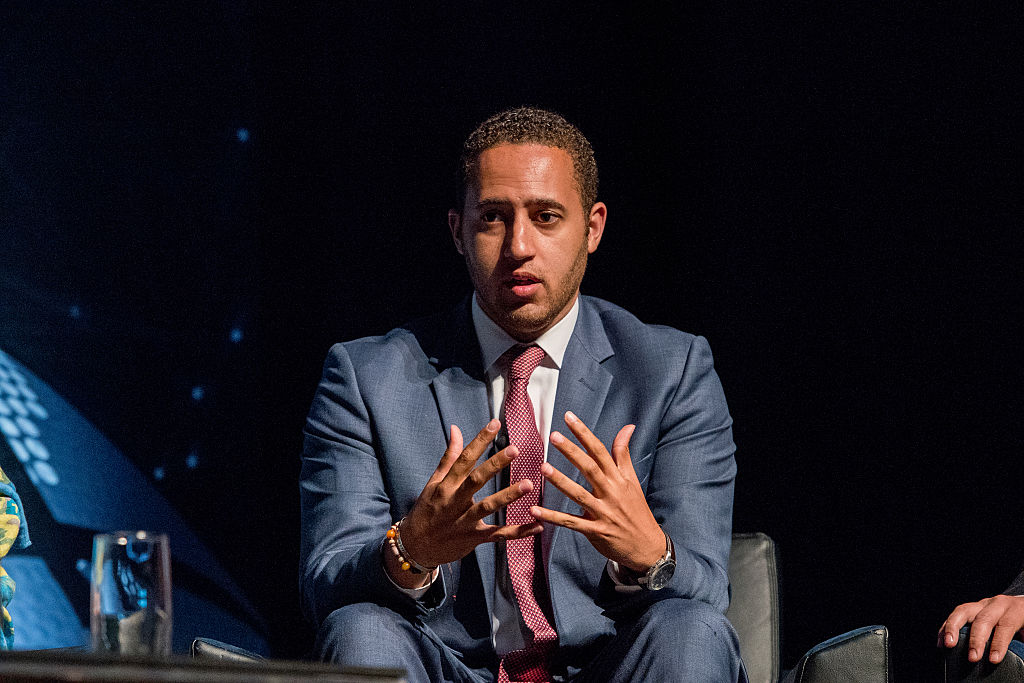
Svante Myrick, the mayor of Ithaca, N.Y., understands the emotional turmoil that comes with housing insecurity. When his mom brought him home from the hospital in the late 1980s, a red eviction notice was pinned to her door and her belongings were strewn on the sidewalks. He proceeded to spend his first few months of life in a homeless shelter—and returned to them, intermittently, over the next eight years.
“I’ve seen firsthand how eviction is more than just a setback,” Myrick, now 33, tells TIME in a recent phone interview. “Losing your home is something of a fiscal cliff that’s impossible to climb back up. Because in order to get rehoused, you need the first month and last [month’s rent] and security deposit, and increasingly credit checks. And how can you get all those without good jobs, and how can you get a good job unless you have a place to stay?”
So it’s perhaps no surprise that the young mayor was among the first in the country to embrace what was seen as a relatively radical policy—rent cancellation—way back in June, after the fall-out from spiking COVID-19 infections had flattened the local economy and threatened thousands with homelessness. Ithaca’s rent cancellation measure would have given the mayor power to forgive rent payments that tenants owed their landlords but couldn’t pay. Only it never went into effect.
Three and a half months after the measure passed Ithaca’s city council, the standstill epitomizes precisely why such policies are nearly impossible to implement. Though throngs of renters from Philadelphia to the Bay Area have abstained from paying rent on an individual basis, culminating in what is probably the largest rent strike in U.S. history, cities and states have so far refused to make the practice legal. Ithaca’s attempt to do so—and its failure to actually implement it so far—illustrates the limited capability municipalities have in responding to economic crises: While the federal government can take on substantial debts to facilitate significant emergency relief efforts, cities and most states are required to maintain balanced budgets.
“If Congress failed to act, which they have, and the state government failed to act, which they have, we would find ourselves in a position where we would have to act,” says Stephen Smith, an Ithaca city council member that helped draft the bill. “We were asking for the power to do something extraordinary in that circumstance.”

Reasons for the standstill
Why, exactly, Ithaca’s extraordinary rent cancellation measure hasn’t materialized into a real policy is complicated.
First, the city doesn’t have the power to cancel rent unilaterally. Back in March, as the pandemic began to infiltrate the state of New York, infecting thousands, and leading to a burgeoning hot spot in New York City, Governor Andrew Cuomo issued an executive order prohibiting cities and towns in the state from issuing pandemic relief efforts without approval from the New York Department of Health. The idea was to streamline policies and prevent municipalities from taking actions that could hurt the state’s public health writ large. One side effect has been major delays in policy implementation.
Pressed for comment, the Department of Health told TIME it is still “reviewing” the city’s drafted executive order. It has been doing so since July 7.
Second, even if the Health Department had expediently granted Ithaca the power to cancel rent, it wouldn’t have resulted in an immediate, citywide rent abolition. Before the measure passed, Mayor Myrick promised the city council that he wouldn’t invoke his newfound authority without first putting together a working group to discuss all the options, including options that included relief for small landlords.
Myrick’s idea all along, he says, was to rely on the new authority as a last resort—to invoke only in case of emergency. At the time, New York states’ eviction moratorium was set to expire, and Myrick worried that if that was allowed to happen, it would trigger mass homelessness in Ithaca. Myrick compares the situation to preventing a devastating fire. Any sensible human would object to a stranger pumping thousands of gallons of water into their home, damaging their belongings in the process. But if that home was engulfed in flames, residents would welcome the action. “We felt the house was on fire this spring,” he says of Ithaca. “And I’m worried that if Congress doesn’t act, the house might catch fire again.”
So far, the federal government has not done much to keep the flames at bay. The CARES Act, which passed in March, established an eviction moratorium for federally financed rental properties. But that provision only applied to approximately 12.3 million units—leaving the occupants of nearly three out of four rental units nationwide without protections. The CARES Act also disbursed one-time stimulus checks and authorized a short-term expansion of unemployment insurance. But both are long-gone now, whereas the pandemic’s effects on the economy aren’t: 11.5 million more Americans are still unemployed at the present versus pre-pandemic levels.
Earlier this month, President Donald Trump signed an executive order giving the Centers for Disease Control and Prevention (CDC) the power to pause evictions for millions more Americans: anybody who earns $99,000 or less in income, has tried to obtain government benefits to afford their rent, has experienced a loss of income or an increase in medical costs, is using “best efforts” to make partial rent payments, and would be at risk of homelessness or having to move into a shared living space if evicted. But that fix is still only a partial one: it doesn’t eliminate the rent tenants owe; it merely saddles landlords with these debts until the protection ends in January, at which point renters will owe back-rent, plus late fees. (If a renter is struggling to keep up with monthly rent payments now, it’s implausible they will have lump sums of cash to catch up with their debts at the start of the New Year.)
‘The truth is, it is a bad policy’
Though Myrick isn’t fond of eviction moratoriums, which, he says, tend to punt rent burdens down the road, he acknowledges Ithaca’s proposal was hardly an ideal solution. In fact, it wasn’t his city council’s first choice either. During a virtual, June 3 city council meeting when the city’s rent cancellation measure was discussed and voted on, some council members objected to the solution entirely.
While largely sympathetic to renters, who make up 73% of Ithaca’s residents, several members of the council worried about the well-being of small landlords as well. What happens to the landlords who still have mortgages to pay? What happens to contractors who are employed by those landlords? What happens to the city’s budget, which relies on those landlords paying their property taxes? “I don’t understand why we would want to take the pain and economic hardship of one group of our citizens and put it on another group of our citizens,” Ithaca Alderman George McGonigal said at the meeting. “We may create a bunch of problems for everybody in the community, including ourselves.”
Myrick saw the flaws, too. He too worried about Ithaca’s smaller landlords, in addition to the city’s already meager budget. “If you just cancel rent, there will be some landlords that lose money, there’ll be some landlords that lose so much money they can’t make their mortgage or tax payments, which could lead to defaults, and tax foreclosures would lead to less revenue for the city, which would mean we could support fewer social services,” he says. “This kind of thing can trigger [an economic] depression.”
Myrick says his preferred policy would have been “a robust universal basic income of $2,000 a month to every American.” Under such a plan, “people have all their basic needs, not just rent, and it would make it easier for people to make choices in the interest of public health, staying home if they can, et cetera.” (Though the idea would provide greater flexibility to cash-strapped Americans, it too would come with major challenges: It would cost trillions of dollars if provided nationwide, and the chances of such a proposal getting past a GOP-led Senate are nonexistent.)
Ultimately, after 30-plus minutes of contentious debate on June 3, the rent cancellation measure passed, on a 6 to 4 vote. The Ithaca Tenants Union, which coordinated with a couple city council members and Myrick to conceptualize the order, celebrated. “When your business is in providing people housing, that’s a certain responsibility you take on if it goes under to not put people on the street,” says Ary Stewart, a 24-year-old member of the renters coalition. If this results in landlords falling behind on their own debts, Stewart says they should “take it up with the bank.”
Myrick, despite his misgivings, helped lead the charge. And in the months since the measure’s passage, the mayor says his office has been calling New York’s Department of Health approximately once a week for an update on the proposal. As the federal relief benefits have dried up, the Ithaca Tenants Union has also taken action into its own hands, orchestrating “phone zaps” where members clog up the New York Department of Health’s phone lines for days on end.
These days, members of the Tenants Union are waiting with bated breath to see if their long-shot proposal becomes a reality. They shouldn’t get their hopes up. Even if the New York Health Department grants the unconventional rent-cancellation plan a green light, city council member Smith says it is much more likely the bill is used as leverage than implemented as written. “Would the mayor have by fiat just canceled rent? The likelihood is extremely low,” he says, answering his own question. “The more likely scenario is that we would have used this as leverage with landlords and let them know that we can cancel rent, or you can come to the table and talk about how we as a community are gonna make sure that we don’t have a massive spike in homelessness.”
Whether, or how, such an untested measure might have worked remains to be seen. In the meantime, Myrick insists the unprecedented plan was worth a shot—even if it wasn’t perfect. “The truth is, it is a bad policy,” he says. “But it’s better than doing nothing.”
More Must-Reads from TIME
- Why Biden Dropped Out
- Ukraine’s Plan to Survive Trump
- The Rise of a New Kind of Parenting Guru
- The Chaos and Commotion of the RNC in Photos
- Why We All Have a Stake in Twisters’ Success
- 8 Eating Habits That Actually Improve Your Sleep
- Welcome to the Noah Lyles Olympics
- Get Our Paris Olympics Newsletter in Your Inbox
Write to Abby Vesoulis at abby.vesoulis@time.com